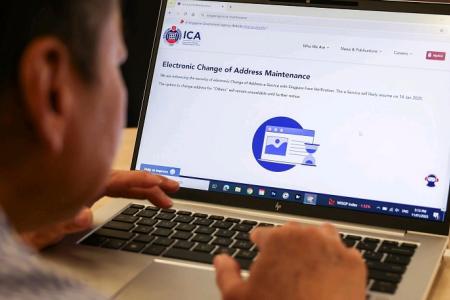6 more caught for allegedly changing other people’s addresses on ICA portal
Another six people have been arrested over their alleged links to a case in which the home addresses of multiple people were changed online through the Immigration and Checkpoints Authority’s (ICA) e-service without their knowledge.
In a statement on Jan 17, the police said that the arrests brings the total number nabbed for their suspected involvement in the crime to 13, after seven people were arrested between Jan 11 and 13.
The six – five men and one woman, aged between 18 and 39 – were traced and arrested after continued islandwide police operations.
Collectively, the 13 suspects are believed to be responsible for at least 66 of the cases of attempted unauthorised changes to residential addresses, said the police.
Of the suspects, 12 are being investigated for alleged offences under the Computer Misuse Act.
Of these, nine are being investigated for abetting or causing unauthorised disclosure of access codes, two for disclosure of access codes in relation to the national digital identity service, and another for transmitting the credentials of another person in relation to the national digital identity service.
Four among the dozen have already been charged, on Jan 15 and 17.
The remaining suspect is being investigated for an alleged offence of transferring benefits from criminal conduct under the Corruption, Drug Trafficking and Other Serious Crimes (Confiscation of Benefits) Act.
Some among the 13 are also being investigated by ICA for alleged breaches of the National Registration Regulations.
ICA had said earlier that as at Jan 13, it found a total of 87 unauthorised attempts to change registered residential addresses, 69 of which were successful.
Following the series of unauthorised attempts, the police visited the addresses to which the suspects had changed the victims’ registered address.
They engaged the occupants to gather information and advise them to secure their mailboxes.
“Four out of 32 valid addresses to where PIN mailers were sent were found to have unsecured or faulty letterboxes, and this would have enabled the perpetrators to easily get the PIN mailers,” said the police.
Those found guilty of unauthorised disclosure of access codes under the Computer Misuse Act can be jailed for up to three years, fined up to $10,000, or both, for first-time offenders.
Individuals convicted of the disclosure of passwords or access codes in relation to the national digital identity service under the same Act can be jailed up to three years, fined up to $10,000, or both, for first-time offenders.
The offence of supplying the credentials of another person in relation to the national digital identity service under the same Act carries a jail term of up to three years, a fine of up to $10,000, or both, for first-time offenders.
Anyone found guilty of transferring benefits from criminal conduct under the Corruption, Drug Trafficking and Other Serious Crimes (Confiscation of Benefits) Act can be jailed up to 10 years, fined up to $500,000, or both.
Breaching the National Registration Regulations carries a jail term of up to two years, a fine of up to $3,000, or both.
Get The New Paper on your phone with the free TNP app. Download from the Apple App Store or Google Play Store now


